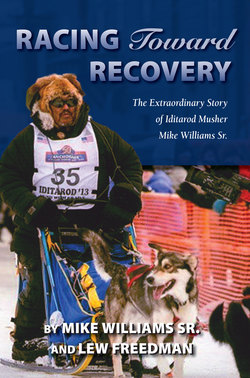Читать книгу Racing Toward Recovery - Lew Freedman - Страница 4
На сайте Литреса книга снята с продажи.
FOREWORDS
ОглавлениеI have known Mike Williams since 1976 when I lived in Bethel. I knew Mike, his brother Walter, who was a really good sprint musher, the best of the best, and I knew his father Tim, who was a fisherman. I moved to Bethel to work for Alaska Fish and Game and everybody fished for salmon for their dogs.
When I first knew Mike, he and his brothers, and just about everyone else in the Bethel area, were subsistence fishermen. Mike and his brothers had a substance abuse problem. It is hard to watch people you really like self-destructing. It was just so sad. So it is incredible what Mike has overcome in his life.
Mike would come from Akiak and stay with me and my husband, Mike, in Bethel. So did his brothers. We loved to have them, but we were so worried about them. Once, I remember somebody going out in the winter without a coat because he was drunk. We prayed they didn’t freeze to death on their way home.
Mike’s brothers all were lost due to problems with alcohol, but Mike overcame the problem. You have to really respect where that man has come from. He is a spiritual inspiration.
Dog mushing was a big part of the Williams brothers’ lives. It brought them into the forefront of the community and gave them some success. The key for Mike being strong was in part due to dog mushing. He recognized the destruction facing his family. His faith in God was the only thing strong enough to change him. And his wife, Maggie, was driven to be successful. She has been incredibly strong for Mike.
The Iditarod became a big part of Mike’s life, too. I always thought that dog mushing can be a real savior for rural Alaska. It gives Alaska Natives a closeness to their culture. I love to see it when Alaska Natives do well in the Iditarod. There is a realization they can be the best in the world. This is one thing that can help save the culture.
When Mike announced that he was going to carry signatures of Alaskans pledging sobriety along the trail to Nome during the Iditarod I was really proud of him. I knew Mike had made a big change in his life.
I think that the Iditarod can be a platform for more than a single year’s race. It is an opportunity to connect with people everywhere. You can squander it or use it. Mike used it and built it so that he became known as the musher for sobriety. Doing well and being out there is admired in his culture, too.
Dog mushing and the Iditarod are so loved and respected in the villages. The people respect that you are regularly taking on the challenge of the thousand miles of the Iditarod. They understand the weather, the elements, and how hard it can be to be out there. The fact that you are in first place or fiftieth place, they don’t care. They respect that you, that Mike, is tough enough to stay with it. Mike has been using his platform in the Iditarod to build something for his people.
Over the years Mike and I have done training runs together. I have been in Akiak and he has been in Willow. I spent the night at their house. Our families are close.
Mike can get a little bit radical at times and there can be differences of opinions over issues, but the person behind what Mike says is someone who is watching his Eskimo culture diminish. At one time Akiak was more of a metropolis than Bethel was. Mike knows of the days when things were really rolling. He remembers the times when there were only honey buckets instead of flush toilets in the Bush. He has worked to make sure his people retain their dignity.
He is right about so many things. Many of our people in Alaska live in more deplorable conditions than in other countries where we send foreign aid.
Mike Williams does what’s good for his people. I think Mike is very sincere. He’s passionate, and his passion shows that he has a great heart. His motivation is correct, that he wants to help people.
—DeeDee Jonrowe
Veteran Iditarod Trail Sled Dog Race musher
